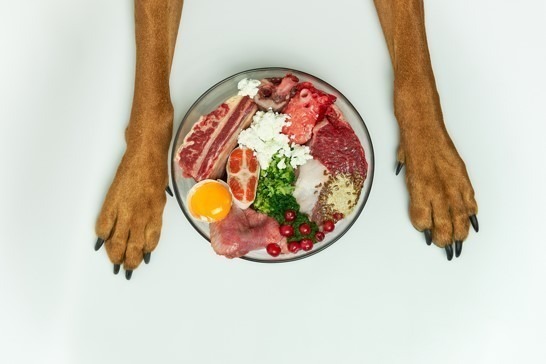Balanced Diet:
Ensure your senior dog is on a well-balanced and age-appropriate diet. As dogs age, their metabolism and dietary needs may change, so consider switching to an old dog food formula or balancing homemade diets that address these changes.
Protein Intake:
Give adequate protein to support muscle health. High-quality animal-based protein sources like eggs, boiled chicken, and boiled fish can help prevent muscle loss and support overall well-being.
Omega-3 Fatty Acids:
Add omega-3 fatty acid sources to their diets, such as fish and flaxseed oil .Omega-3s contribute to skin coat and joint health; they have anti-inflammatory properties that can benefit dogs with arthritis or joint stiffness.
Caloric Adjustments:
Monitor your senior dog’s weight and adjust their caloric intake accordingly. Older dogs may be less active, so avoiding overfeeding and maintaining a healthy weight is essential to prevent obesity-related health issues.
Hydration:
Ensure your senior dog stays well-hydrated, even in cold weather. Dehydration can occur in winter due to dry air and heating systems. Signs of dehydration include sluggishness and dry skin. Provide access to fresh water at all times, and consider adding warm water, vegetable broth, or buttermilk to their meals if they prefer it.
Fibre Content:
Adequate fibre in the diet can help with digestion. You can give fresh pumpkin puree, carrots, etc, And prevent constipation, which may be more common in senior dogs. Consult your vet to determine the appropriate fibre level for your dog’s needs.
Regular Vet Check-ups:
Schedule regular veterinary check-ups at least twice yearly to monitor your senior dog’s health and nutritional needs. Your vet can recommend specific dietary adjustments based on your dog’s age, health condition, and concerns.
Warming Foods:
Consider providing warming foods like lightly cooked or warmed meals in colder weather. Try bone broth chicken soup; it is especially beneficial for senior dogs with dental issues or those who may have difficulty chewing hard kibble.
Treats in Moderation:
If you give treats, choose healthy or home-cooked treats for senior-friendly options, and be mindful of Excessive treats, they can contribute to weight gain.
Remember to consult your veterinarian before significantly changing your senior dog’s diet. Get tailored advice on your dog’s health status and nutritional requirements, ensuring they receive the best care during winter and beyond.
https://www.myfurries.com/video-consultBook A Session with senior Vets now



